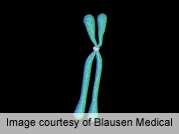BRCAPRO model underestimates BRCA1/2 mutation risk

(HealthDay)—Use of the BRCAPRO model for assessment of the likelihood of having a germline BRCA1/BRCA2 mutation, based on age, ethnicity, and family history, may underestimate the risk of mutations, according to a study published online March 17 in the Journal of Clinical Oncology.
Molly S. Daniels, from the University of Texas MD Anderson Cancer Center in Houston, and colleagues calculated BRCAPRO scores for 589 patients with ovarian cancer referred for genetic counseling at three institutions. The BRCAPRO predictions were compared with observed mutations.
The researchers found that 31 percent of patients with ovarian cancer tested positive for BRCA1 or BRCA2 mutation. More mutations were observed than expected with BRCAPRO scores <40 percent (93 mutations observed versus 34.1 mutations expected; P < 0.001). Twenty-eight percent of mutations (51 of 180) would have been missed if patients with BRCAPRO scores <10 percent had not been tested. The risk for high-grade serous ovarian cancers was underestimated with BRCAPRO, but it overestimated the risk for other histologies (P < 0.001). Underestimation increased with decreasing age at diagnosis, and there was institution-level variation in model performance (both P = 0.02).
"This study demonstrates that assessment of family history by a validated model cannot effectively target testing to a high-risk ovarian cancer patient population, which strongly supports the recommendation to offer BRCA1/BRCA2 genetic testing to all patients with high-grade serous ovarian cancer regardless of family history," the authors write.
More information:
Abstract
Full Text (subscription or payment may be required)
Copyright © 2014 HealthDay. All rights reserved.
















